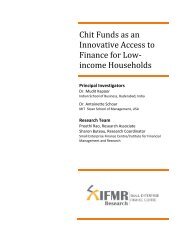Government of India Volume I: Analysis and Recommendations
Government of India Volume I: Analysis and Recommendations
Government of India Volume I: Analysis and Recommendations
Create successful ePaper yourself
Turn your PDF publications into a flip-book with our unique Google optimized e-Paper software.
TRANSITION ISSUES<br />
On the functional side, certain preparatory steps can be taken. The Commission recommends<br />
the creation <strong>of</strong> an “Interim Co-ordination Council” <strong>of</strong> existing regulators, namely, SEBI, FMC, PFRDA<br />
<strong>and</strong> IRDA, that are to be merged to create the UFA.<br />
The following are the recommendations <strong>of</strong> the Commission on how the implementation<br />
<strong>of</strong> each <strong>of</strong> the agency may take place:<br />
1. UFA<br />
2. RBI<br />
(a) On acceptance: An interim Board, without any powers, should be set up using<br />
an executive order. This Board will evaluate existing regulations <strong>and</strong> prepare<br />
for the eventual setting up <strong>of</strong> the UFA. Further, a co-ordination committee<br />
will be set up between all regulators that will be subsumed under UFA.<br />
(b) On passage <strong>of</strong> draft Code: The Board will be appointed as the <strong>of</strong>ficial board<br />
under the law. All financial sector regulators other than RBI shall be subsumed<br />
under UFA. All the subsumed regulators will change letter heads <strong>and</strong> continue<br />
to function. Employees will be transferred. The Board will begin consultation<br />
on new regulations. Existing regulations will transition to new regulations over<br />
time.<br />
(c) Law + 2 years: Regulations existing before the passage <strong>of</strong> the draft Code will<br />
lapse. By this time, the Board must have replaced the entire subsidiary legislation<br />
<strong>and</strong> consolidated all subsumed agencies.<br />
(a) On acceptance: The RBI Board will evaluate existing regulations <strong>and</strong> prepare<br />
for the eventual transformation <strong>of</strong> the RBI. The Board will start taking steps to<br />
shift out functions <strong>of</strong> the PDMA <strong>and</strong> plan the establishment <strong>of</strong> the MPC process.<br />
(b) On passage <strong>of</strong> draft Code: The Board will need to be reconstituted reflecting<br />
the provisions <strong>of</strong> the law. The Board will begin consultation on new regulations.<br />
Existing regulations will transition to new regulations over time. PDMA<br />
<strong>and</strong> MPC will come into existence.<br />
(c) Law + 2 years: Regulations existing before the passage <strong>of</strong> draft Code will<br />
lapse. By this time, the Board must have replaced the entire subsidiary legislation.<br />
3. Resolution Corporation<br />
4. FRA<br />
(a) On acceptance: An interim Board, without any powers, should be set up using<br />
an executive order. This Board will evaluate existing rules <strong>and</strong> prepare for<br />
the eventual setting up <strong>of</strong> the Resolution Corporation.<br />
(b) On passage <strong>of</strong> draft Code: The Board will be appointed as the <strong>of</strong>ficial board<br />
under the law. DICGC will cease to exist <strong>and</strong> its obligations will be subsumed<br />
by the Resolution Corporation till the new rules are put in place. Employees<br />
will be transferred or reverted. The Board will begin consultation on new regulations.<br />
Existing regulations will transition to the new regulations over time.<br />
(c) Law + 2 years: By this time, the Resolution Corporation will be fully functional<br />
<strong>and</strong> the new set <strong>of</strong> rules will be in place.<br />
(a) On acceptance: An interim Board, without any powers, should be set up using<br />
an executive order. This Board will evaluate existing rules <strong>and</strong> prepare for<br />
the eventual setting up <strong>of</strong> the FRA.<br />
(b) On passage <strong>of</strong> draft Code: The Board will be appointed as the <strong>of</strong>ficial board<br />
under the law. Existing rules <strong>and</strong> ombudsmen will transition to new rules <strong>and</strong><br />
agency over time.<br />
138 FINANCIAL SECTOR LEGISLATIVE REFORMS COMMISSION



